Research Assignment: Defining Research, Types, and Data Collection
VerifiedAdded on 2023/01/06
|6
|829
|37
Homework Assignment
AI Summary
This homework assignment begins by defining research as a creative and systematic process aimed at enhancing knowledge, including data collection, analysis, and the generation of new concepts and methodologies. It distinguishes between primary and secondary research, detailing their methodologies and applications. The assignment then differentiates between quantitative and qualitative research, outlining their conceptual and methodological differences. It lists various types of quantitative and qualitative research methods. The assignment concludes by examining the advantages and disadvantages of data collection methods such as interviews and survey questionnaires. The assignment is supported by a list of referenced books and journals, providing a comprehensive overview of the research topic.
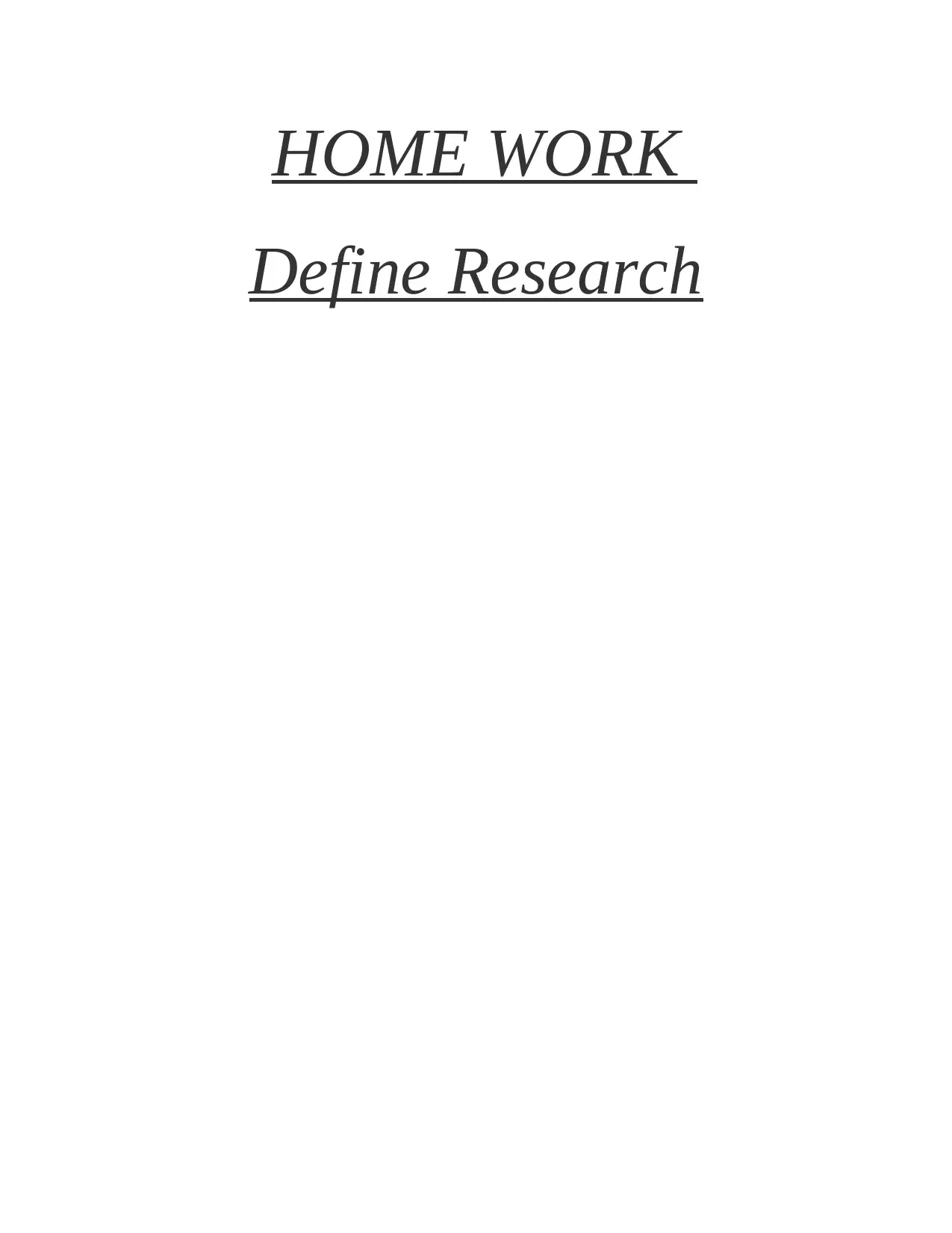
HOME WORK
Define Research
Define Research
Paraphrase This Document
Need a fresh take? Get an instant paraphrase of this document with our AI Paraphraser
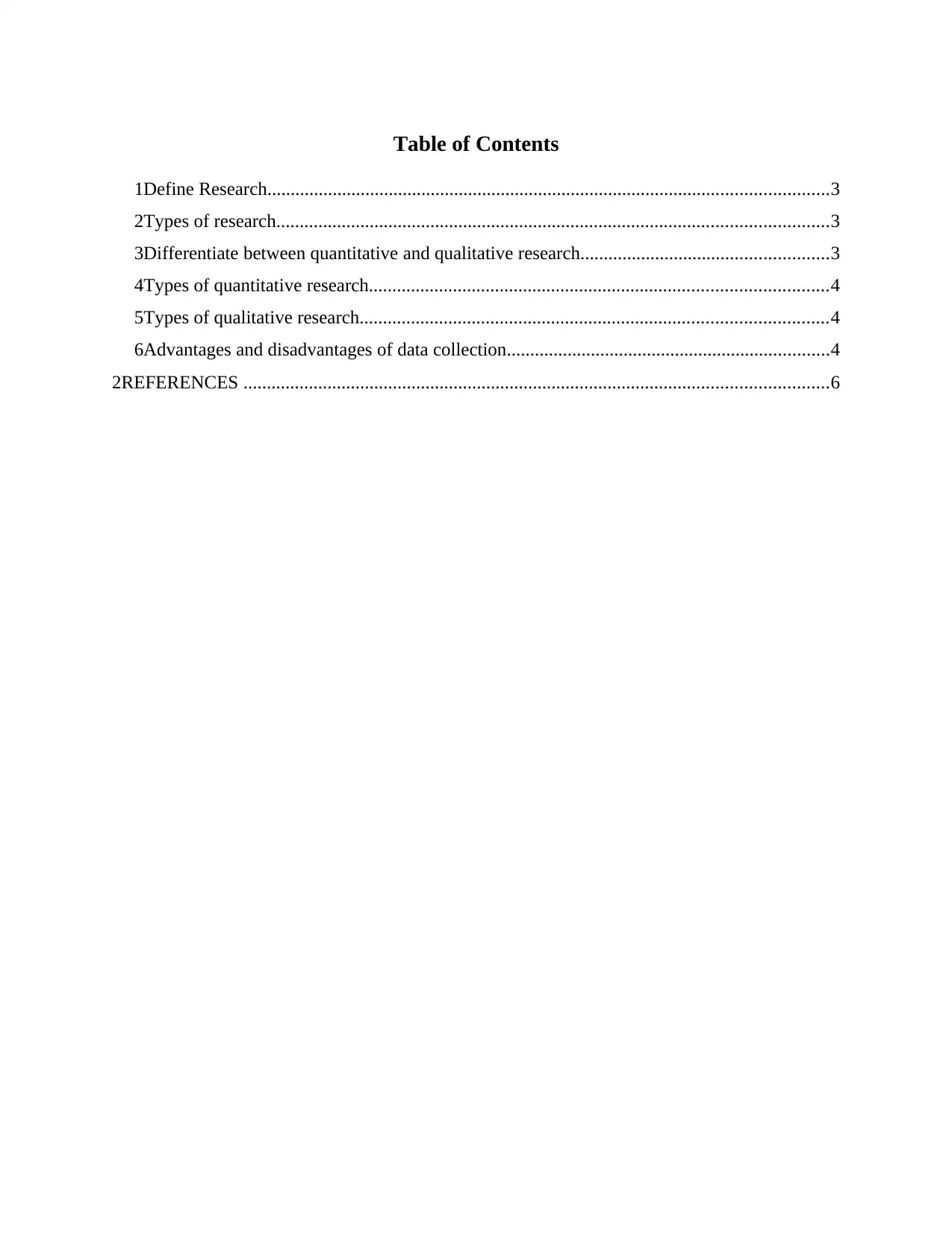
Table of Contents
1Define Research........................................................................................................................3
2Types of research......................................................................................................................3
3Differentiate between quantitative and qualitative research.....................................................3
4Types of quantitative research..................................................................................................4
5Types of qualitative research....................................................................................................4
6Advantages and disadvantages of data collection.....................................................................4
2REFERENCES .............................................................................................................................6
1Define Research........................................................................................................................3
2Types of research......................................................................................................................3
3Differentiate between quantitative and qualitative research.....................................................3
4Types of quantitative research..................................................................................................4
5Types of qualitative research....................................................................................................4
6Advantages and disadvantages of data collection.....................................................................4
2REFERENCES .............................................................................................................................6

⊘ This is a preview!⊘
Do you want full access?
Subscribe today to unlock all pages.

Trusted by 1+ million students worldwide
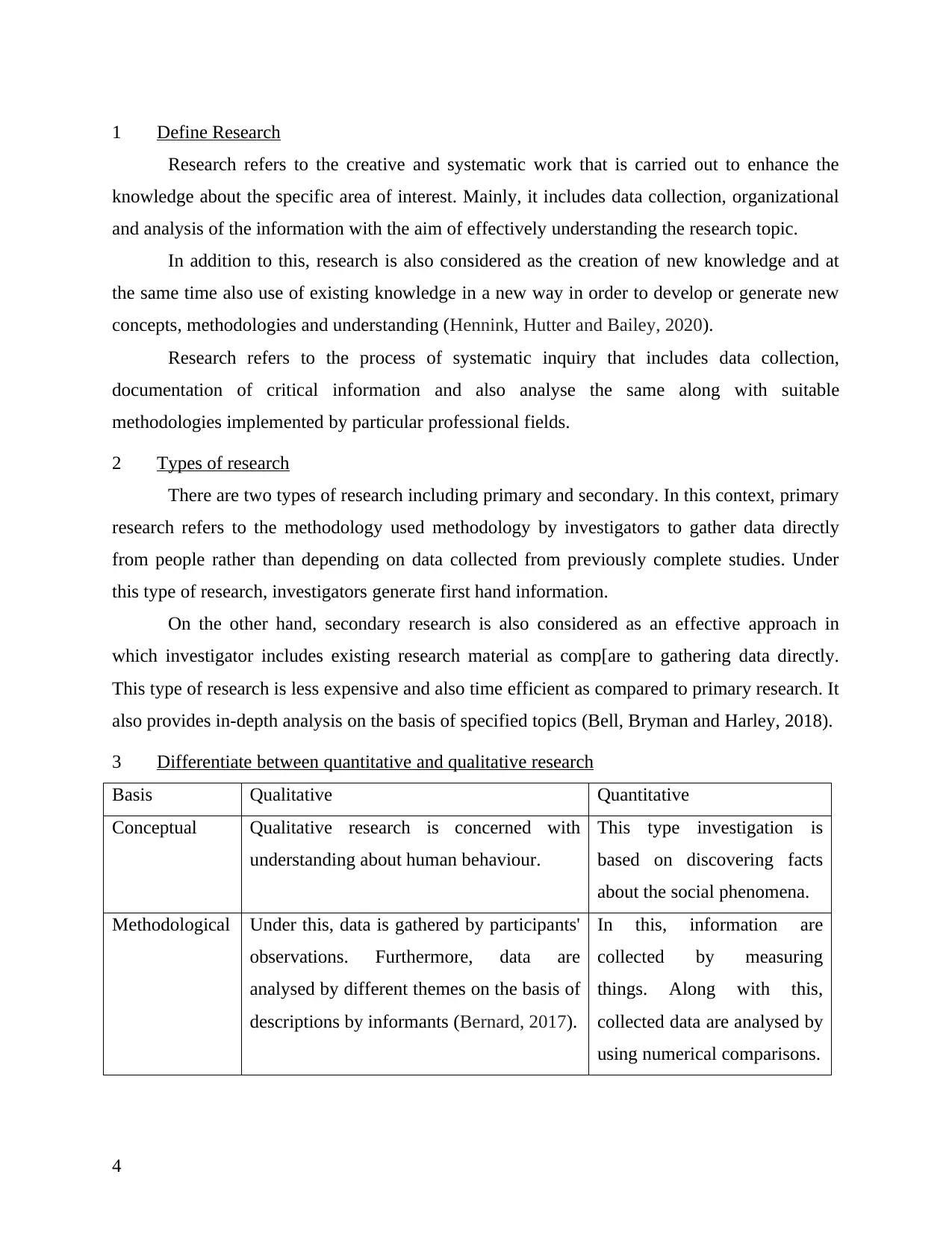
1 Define Research
Research refers to the creative and systematic work that is carried out to enhance the
knowledge about the specific area of interest. Mainly, it includes data collection, organizational
and analysis of the information with the aim of effectively understanding the research topic.
In addition to this, research is also considered as the creation of new knowledge and at
the same time also use of existing knowledge in a new way in order to develop or generate new
concepts, methodologies and understanding (Hennink, Hutter and Bailey, 2020).
Research refers to the process of systematic inquiry that includes data collection,
documentation of critical information and also analyse the same along with suitable
methodologies implemented by particular professional fields.
2 Types of research
There are two types of research including primary and secondary. In this context, primary
research refers to the methodology used methodology by investigators to gather data directly
from people rather than depending on data collected from previously complete studies. Under
this type of research, investigators generate first hand information.
On the other hand, secondary research is also considered as an effective approach in
which investigator includes existing research material as comp[are to gathering data directly.
This type of research is less expensive and also time efficient as compared to primary research. It
also provides in-depth analysis on the basis of specified topics (Bell, Bryman and Harley, 2018).
3 Differentiate between quantitative and qualitative research
Basis Qualitative Quantitative
Conceptual Qualitative research is concerned with
understanding about human behaviour.
This type investigation is
based on discovering facts
about the social phenomena.
Methodological Under this, data is gathered by participants'
observations. Furthermore, data are
analysed by different themes on the basis of
descriptions by informants (Bernard, 2017).
In this, information are
collected by measuring
things. Along with this,
collected data are analysed by
using numerical comparisons.
4
Research refers to the creative and systematic work that is carried out to enhance the
knowledge about the specific area of interest. Mainly, it includes data collection, organizational
and analysis of the information with the aim of effectively understanding the research topic.
In addition to this, research is also considered as the creation of new knowledge and at
the same time also use of existing knowledge in a new way in order to develop or generate new
concepts, methodologies and understanding (Hennink, Hutter and Bailey, 2020).
Research refers to the process of systematic inquiry that includes data collection,
documentation of critical information and also analyse the same along with suitable
methodologies implemented by particular professional fields.
2 Types of research
There are two types of research including primary and secondary. In this context, primary
research refers to the methodology used methodology by investigators to gather data directly
from people rather than depending on data collected from previously complete studies. Under
this type of research, investigators generate first hand information.
On the other hand, secondary research is also considered as an effective approach in
which investigator includes existing research material as comp[are to gathering data directly.
This type of research is less expensive and also time efficient as compared to primary research. It
also provides in-depth analysis on the basis of specified topics (Bell, Bryman and Harley, 2018).
3 Differentiate between quantitative and qualitative research
Basis Qualitative Quantitative
Conceptual Qualitative research is concerned with
understanding about human behaviour.
This type investigation is
based on discovering facts
about the social phenomena.
Methodological Under this, data is gathered by participants'
observations. Furthermore, data are
analysed by different themes on the basis of
descriptions by informants (Bernard, 2017).
In this, information are
collected by measuring
things. Along with this,
collected data are analysed by
using numerical comparisons.
4
Paraphrase This Document
Need a fresh take? Get an instant paraphrase of this document with our AI Paraphraser
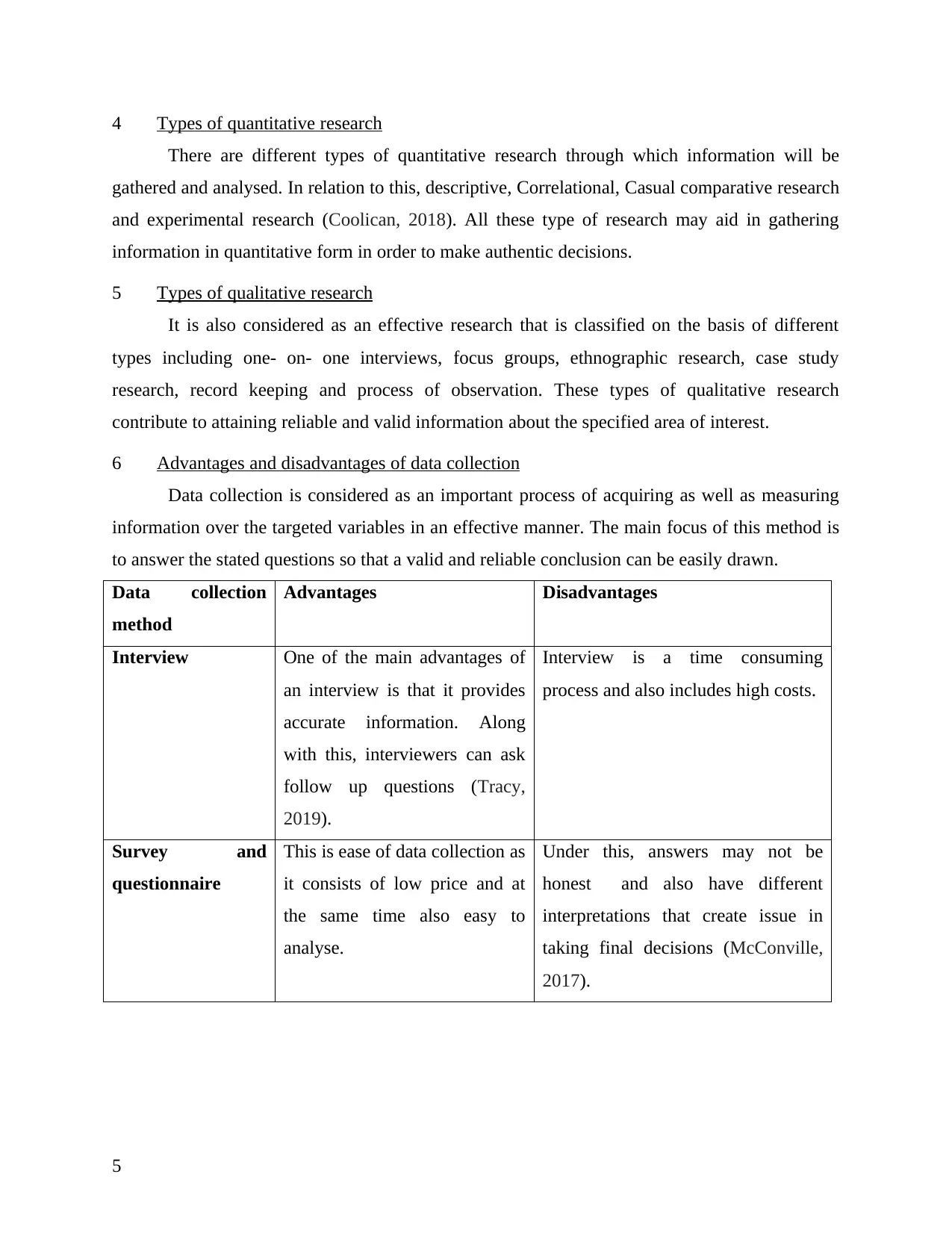
4 Types of quantitative research
There are different types of quantitative research through which information will be
gathered and analysed. In relation to this, descriptive, Correlational, Casual comparative research
and experimental research (Coolican, 2018). All these type of research may aid in gathering
information in quantitative form in order to make authentic decisions.
5 Types of qualitative research
It is also considered as an effective research that is classified on the basis of different
types including one- on- one interviews, focus groups, ethnographic research, case study
research, record keeping and process of observation. These types of qualitative research
contribute to attaining reliable and valid information about the specified area of interest.
6 Advantages and disadvantages of data collection
Data collection is considered as an important process of acquiring as well as measuring
information over the targeted variables in an effective manner. The main focus of this method is
to answer the stated questions so that a valid and reliable conclusion can be easily drawn.
Data collection
method
Advantages Disadvantages
Interview One of the main advantages of
an interview is that it provides
accurate information. Along
with this, interviewers can ask
follow up questions (Tracy,
2019).
Interview is a time consuming
process and also includes high costs.
Survey and
questionnaire
This is ease of data collection as
it consists of low price and at
the same time also easy to
analyse.
Under this, answers may not be
honest and also have different
interpretations that create issue in
taking final decisions (McConville,
2017).
5
There are different types of quantitative research through which information will be
gathered and analysed. In relation to this, descriptive, Correlational, Casual comparative research
and experimental research (Coolican, 2018). All these type of research may aid in gathering
information in quantitative form in order to make authentic decisions.
5 Types of qualitative research
It is also considered as an effective research that is classified on the basis of different
types including one- on- one interviews, focus groups, ethnographic research, case study
research, record keeping and process of observation. These types of qualitative research
contribute to attaining reliable and valid information about the specified area of interest.
6 Advantages and disadvantages of data collection
Data collection is considered as an important process of acquiring as well as measuring
information over the targeted variables in an effective manner. The main focus of this method is
to answer the stated questions so that a valid and reliable conclusion can be easily drawn.
Data collection
method
Advantages Disadvantages
Interview One of the main advantages of
an interview is that it provides
accurate information. Along
with this, interviewers can ask
follow up questions (Tracy,
2019).
Interview is a time consuming
process and also includes high costs.
Survey and
questionnaire
This is ease of data collection as
it consists of low price and at
the same time also easy to
analyse.
Under this, answers may not be
honest and also have different
interpretations that create issue in
taking final decisions (McConville,
2017).
5
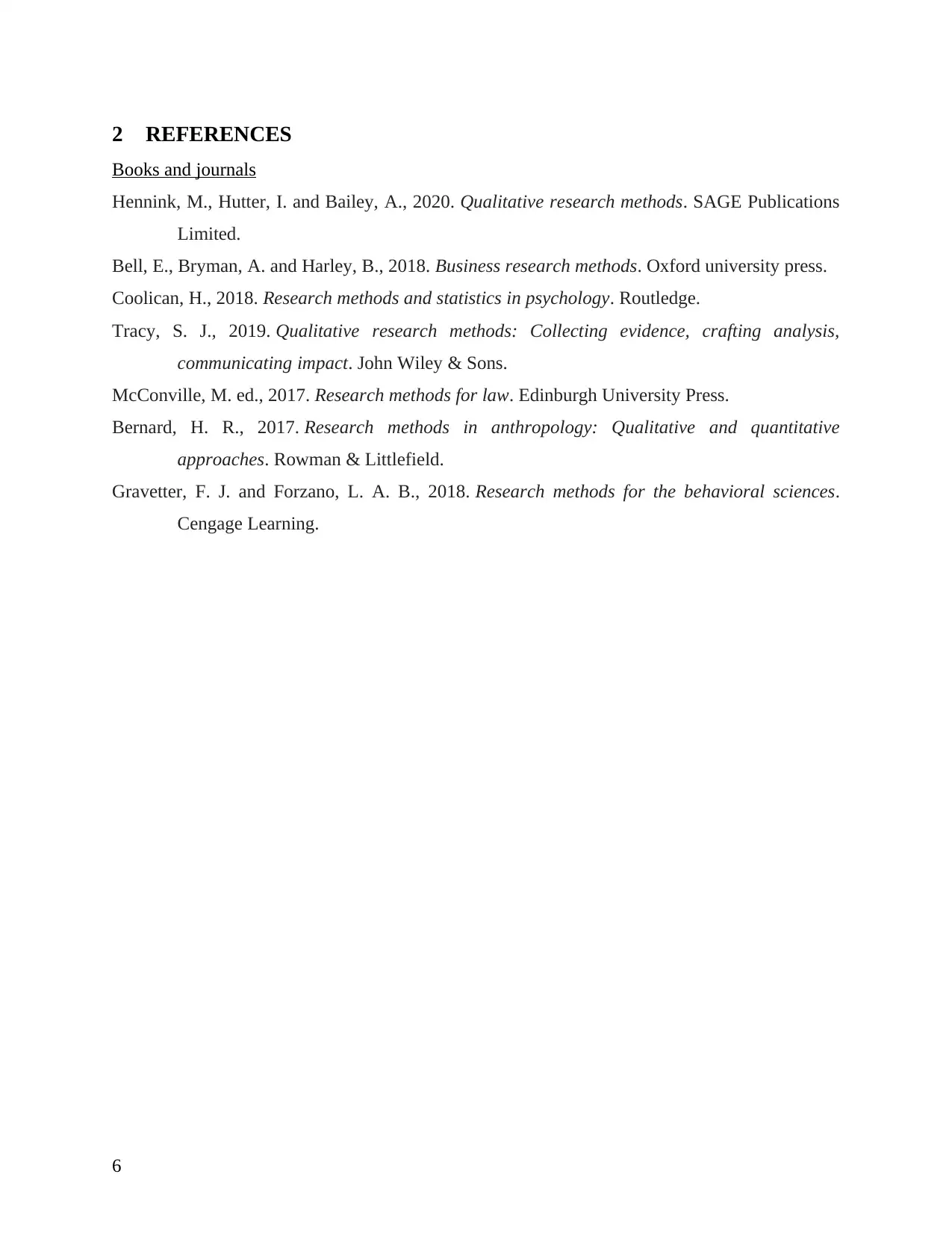
2 REFERENCES
Books and journals
Hennink, M., Hutter, I. and Bailey, A., 2020. Qualitative research methods. SAGE Publications
Limited.
Bell, E., Bryman, A. and Harley, B., 2018. Business research methods. Oxford university press.
Coolican, H., 2018. Research methods and statistics in psychology. Routledge.
Tracy, S. J., 2019. Qualitative research methods: Collecting evidence, crafting analysis,
communicating impact. John Wiley & Sons.
McConville, M. ed., 2017. Research methods for law. Edinburgh University Press.
Bernard, H. R., 2017. Research methods in anthropology: Qualitative and quantitative
approaches. Rowman & Littlefield.
Gravetter, F. J. and Forzano, L. A. B., 2018. Research methods for the behavioral sciences.
Cengage Learning.
6
Books and journals
Hennink, M., Hutter, I. and Bailey, A., 2020. Qualitative research methods. SAGE Publications
Limited.
Bell, E., Bryman, A. and Harley, B., 2018. Business research methods. Oxford university press.
Coolican, H., 2018. Research methods and statistics in psychology. Routledge.
Tracy, S. J., 2019. Qualitative research methods: Collecting evidence, crafting analysis,
communicating impact. John Wiley & Sons.
McConville, M. ed., 2017. Research methods for law. Edinburgh University Press.
Bernard, H. R., 2017. Research methods in anthropology: Qualitative and quantitative
approaches. Rowman & Littlefield.
Gravetter, F. J. and Forzano, L. A. B., 2018. Research methods for the behavioral sciences.
Cengage Learning.
6
⊘ This is a preview!⊘
Do you want full access?
Subscribe today to unlock all pages.

Trusted by 1+ million students worldwide
1 out of 6
Related Documents
Your All-in-One AI-Powered Toolkit for Academic Success.
+13062052269
info@desklib.com
Available 24*7 on WhatsApp / Email
![[object Object]](/_next/static/media/star-bottom.7253800d.svg)
Unlock your academic potential
Copyright © 2020–2026 A2Z Services. All Rights Reserved. Developed and managed by ZUCOL.




